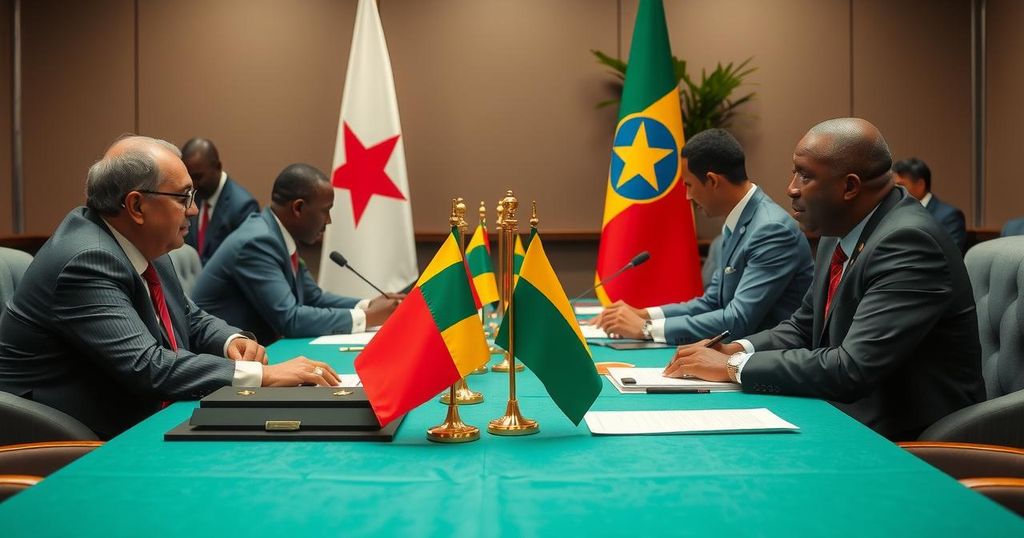Global news
AFRICA, AFRICAN UNION, AFRICAN UNION COMMISSION, ANKARA, DIPLOMACY, EAST AFRICA, EUROPE/ASIA, HASSAN SHEIKH, HASSAN SHEIKH MOHAMUD, IGAD, INTERGOVERNMENTAL AUTHORITY ON DEVELOPMENT, INTERNATIONAL RELATIONS, MOHAMUD, MOUSSA FAKI MAHAMAT, REGIONAL COOPERATION, SOMALIA, SOMALILAND, TURKEY, WORK
Isaac Bennett
0 Comments
African Union Urges Swift Implementation of Somalia-Ethiopia Agreement
The African Union has urged Ethiopia and Somalia to promptly execute a newfound agreement to alleviate tensions over sea access. The accord follows complications stemming from Ethiopia’s deal with Somaliland, leading to Somalia’s accusations of sovereignty violation. The agreement highlights mutual cooperation, with technical talks planned. Global leaders have expressed their support for peaceful negotiations, while uncertainties linger about existing agreements with Somaliland.
The African Union has called upon Ethiopia and Somalia to expeditiously implement their recently reached agreement aimed at ameliorating tensions concerning Ethiopia’s access to the sea. This agreement emerged following protracted disputes after Ethiopia engaged in a deal with Somaliland—a self-declared independent region of Somalia—leasing coastal territory for a port and military facility. Although Somaliland sought recognition from Ethiopia in this context, such acknowledgment remains unconfirmed by Ethiopian authorities. Somalia perceives the agreement as a breach of its sovereignty, raising significant concerns regarding the possibility of renewed conflict in the region.
Amidst diplomatic efforts, a brokered accord was announced by Turkey, prompting optimism from both Ethiopian Prime Minister Abiy Ahmed and Somali President Hassan Sheikh Mohamud, who acknowledged their mutual interests in fostering cooperation. The African Union Commission Chairman, Moussa Faki Mahamat, commended the leaders’ initiative yet underscored the necessity for swift enactment of the accord, without providing specifics on the agreed measures.
The agreement outlines intentions to cooperate on commercial and bilateral matters, ensuring Ethiopia’s secure access to the sea within the overarching authority of Somalia. Technical discussions are scheduled to commence by the end of February, anticipated to conclude within four months, employing dialogue to resolve any disputes, potentially with Turkey’s assistance. High-ranking officials from the United States and the United Nations expressed support for the negotiations and the commitment to affirm each nation’s sovereignty and territorial integrity.
Despite the progress toward peace, uncertainty surrounds the future impact on the controversial agreement between Somaliland and Ethiopia. Ethiopian officials have remained silent about the status of this earlier memorandum. Notably, Ethiopia’s Prime Minister has reiterated the need for coastal access while simultaneously indicating a disinterest in resorting to military conflicts. Somalia has strengthened its alliances with Egypt and has taken actions against Ethiopian representation within its territory, reflecting ongoing geopolitical tensions in the Horn of Africa.
Following Eritrea’s independence in 1993, Ethiopia became a landlocked nation, necessitating access to the sea for economic and strategic reasons. This situation has complicated relations with Somalia, particularly after Ethiopia established a port deal with Somaliland in 2021, a region that declared independence but remains unrecognized by Somalia. The volatile nature of these relationships has been exacerbated by historical conflicts, regional alliances, and ongoing discussions about sovereignty and territorial integrity. The African Union plays a critical role in navigating these complex dynamics, aiming to foster peace and cooperation among East African nations.
The recent agreement between Ethiopia and Somalia represents a potentially significant stride towards resolving longstanding tensions regarding maritime access. The urgency expressed by the African Union for swift implementation of the accord underscores the high stakes involved for both nations. Although the situation remains delicate with unresolved issues surrounding Somaliland’s role, the commitment to dialogue and cooperation may pave the way for a more stable regional environment in the Horn of Africa.
Original Source: www.enca.com




Post Comment